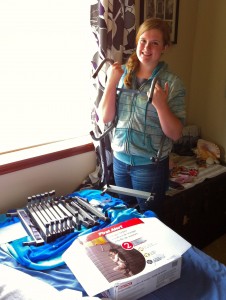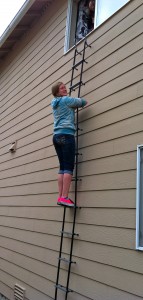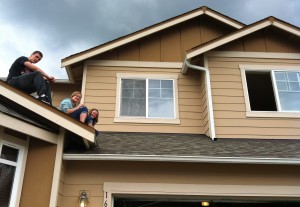 Recently we purchased two second story escape ladders. As previously mentioned we have two bedrooms with windows that are about 14 feet off the ground, our master bedroom and Emily’s room. We bought a ladder to keep in each room.
Recently we purchased two second story escape ladders. As previously mentioned we have two bedrooms with windows that are about 14 feet off the ground, our master bedroom and Emily’s room. We bought a ladder to keep in each room.
Because buying stuff is easy and it’s a good idea to practice with emergency items before you need them, we pulled the ladder out of the box and actually used it. I had Emily do most of the set-up because it will be in her room. I had to start off by explaining to the younger girls how to remove a window screen (don’t assume). Emily then hung the ladder handles from the window ledge and released the ladder to fall, against the side of the house, to the ground. Once I determined everything looked right and was secure, Emily climbed through the window and down the ladder. The rope ladder moved around a lot as she climbed down it, and she was more than a little nervous, but she did it. She was  followed by Alison, also nervous, and Ryan, not nervous (Brynn was away at camp). We discussed that, in an emergency, Ryan would go last after ensuring everyone was out okay.
followed by Alison, also nervous, and Ryan, not nervous (Brynn was away at camp). We discussed that, in an emergency, Ryan would go last after ensuring everyone was out okay.
We then went to Alison and Brynn’s room which opens onto the roof above the garage (Ryan’s is next to theirs and opens to the same area). The screen was removed and the kids climbed out onto the roof. I was on the ground. My original plan was to have them hang from the roof and drop to the ground; having Ryan go first so that he can help the girls. After looking around I realized there was nothing safe to hold onto, the gutter was too weak and there were no other suitable edges. We decided to try the ladder, attached to the girls’ window down the roof and off the side. That worked okay and the kids were all able to climb down. I considered getting more ladders for those rooms but decided they probably weren’t necessary. We came to the conclusion that they could get out the windows, away from any potential danger, and wait on the roof for assistance; if they had to they could hang and drop from the gutters (but we didn’t want to practice this because we believe the gutters would be damaged from the weight).
 It wasn’t rocket science to figure out how to use the ladder, and yes had there been an emergency we could have figured it out then. But the best time to learn a new skill, or a new piece of equipment, is not when an emergency is happening. There will already be anxiety, stress, and fear; possibly darkness, cold, and rain to deal with. Knowing how to use your emergency equipment will give you, and your family, the confidence needed to get through the disaster. And while a sudden life-threatening fire while we’re in the house–the most likely threat to cause people to escape through a window–is not a likely event, it is possible. We decided it was worth the purchase and practice to allow us to be prepared for that–or another similar–eventuality.
It wasn’t rocket science to figure out how to use the ladder, and yes had there been an emergency we could have figured it out then. But the best time to learn a new skill, or a new piece of equipment, is not when an emergency is happening. There will already be anxiety, stress, and fear; possibly darkness, cold, and rain to deal with. Knowing how to use your emergency equipment will give you, and your family, the confidence needed to get through the disaster. And while a sudden life-threatening fire while we’re in the house–the most likely threat to cause people to escape through a window–is not a likely event, it is possible. We decided it was worth the purchase and practice to allow us to be prepared for that–or another similar–eventuality.
(Friday: What We Did This Week To Prep)











